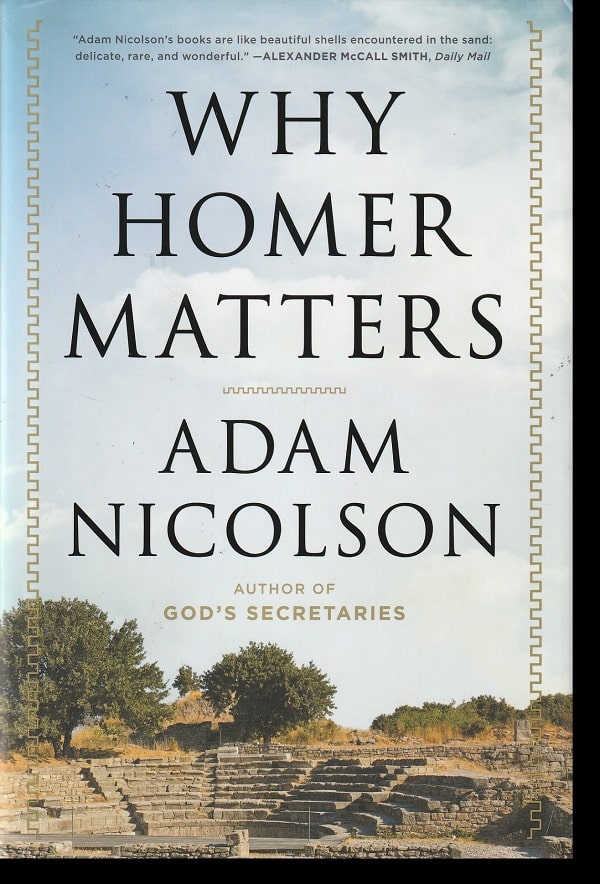If Homer’s epic poems The Iliad and The Odyssey were movies, they’d come with a content warning: Graphic Violence.
After all, the one is all about the bloody and gruesome hand-to-hand combat before the walls of Troy, and the other is capped by not one but two massacres, the slaying by Odysseus of more than 100 freeloading suitors for his wife’s hand and the hanging of a dozen women slaves for sleeping with those suitors.
But you wouldn’t expect that a trigger warning would be needed for a book that is called Why Homer Matters.
Nonetheless, as a reader, I could have used one.
At the midway point in the book, I was floored when author Adam Nicholson, suddenly, out of nowhere, told how he felt and acted when, as a 25-year-old tourist wandering outside Palmyra in the Syrian desert, he was raped by a knife-wielding attacker.
For more than three full pages, Nicholson went into explicit detail about the attack and what led up to it and who followed.
It came after a long discussion of the role of sharp bladed weapons in the Bronze Age and in Homer’s epics and was followed by a long recounting of a 20th-century German archaeologist’s effort to find the entrance to Hades, as depicted in The Odyssey.
Why, at this particular point in his book, did Nicholson feel the need to write about being raped? Or at all in his book?
Perplexed by the scene and the book
I was, as I say, perplexed by the scene. However, I had been perplexed by Nicolson’s book already for more than 120 pages, and I would find that the remaining 120 pages or so were similarly perplexing.
One problem, as exemplified to the nth degree with the rape scene, was Nicolson’s tendency to write himself into a book titled Why Homer Matters. Perhaps his goal was to liven up a 21st-century discussion of epics that are at least 2,800 years old. If so, I found all of the “I” sections pretty much beside the point.
Another problem is that Nicolson uses the first half of his book in rabbit-hole ruminations on whom Homer was and when he lived, even though he acknowledges that no one knows the answer to those questions.
Or to these others: Was there a Homer who composed both epics, rooted as they were initially in oral recitation rather than written down? Or was Homer the person who took oral versions of the epics that had been in circulation for centuries and wrote them down? Or were there multiple Homers?
So much of this early section of searching for the Homer of antiquity struck me as akin to the search for Noah’s ark.
A war so a story can be told?

Yet another problem is that Nicolson doesn’t engage with Homer’s epics — I use the term “Homer” for simplicity’s sake — until the second half of the book.
And then he makes the statement that seems to say that the meaning of the war in the Iliad was so that the epic poem could be written:
Homer then had the bard — a blind man whose name is Demodocus, which means “popular with the people”— say something that drives far into the center of what Homer means and why Homer matters: “The gods did this and spun the destruction of the people/for the sake of the singing of men hereafter.” The song, this poem, this story, is the divine purpose of the war. The war happened so that the poem could happen.
That’s like saying that Putin invaded Ukraine so that someone could write a song praising him as a hero. While the Russian leader may have some ego-boosting reasons behind the attack, there were a lot more practical and real-world aims to the invasion — a lot more.
Why does Homer matter?
And a final problem is that, in a book titled Why Homer Matters, the mention above in a paragraph two-thirds of the way through the text is Nicholson’s only move to address the question until the final three pages.
Then, Nicolson writes:
That is his value, a reservoir of understanding beyond the grief and turbulence of a universe in which there is no final authority.
I am aware of how twenty-first-century that sounds — Homer with no trust in the metaphysical; a multiculturalist, able to empathize with both gang and city; a fusionist, seeing in Odysseus a man who might bring together the virtues of both worlds; even a liberal and a feminist, who has a deep understanding of the dignity and beauty of women, their central rule in human destiny.
Nevertheless, it is a picture of Homer that seems true…
I’m sorry. All of that is Nicolson’s attempt to jam Homer into a 21st-century mold, and it’s totally wrong-headed.
The Iliad and The Odyssey — no matter what individual or many individuals took part in their creation — are great works of literature. And the measure of their greatness is how they don’t fit into the cultural values of a single era but, in their beauty and insight, say something universal about all human beings of all eras that have come and will come.
Maybe that’s another content warning that Why Homer Matters should also carry — Wrong-headed.
Patrick T. Reardon
5.18.23
Written by : Patrick T. Reardon
For more than three decades Patrick T. Reardon was an urban affairs writer, a feature writer, a columnist, and an editor for the Chicago Tribune. In 2000 he was one of a team of 50 staff members who won a Pulitzer Prize for explanatory reporting. Now a freelance writer and poet, he has contributed chapters to several books and is the author of Faith Stripped to Its Essence. His website is https://patricktreardon.com/.

I still don’t know why Homer matters.
You certainly couldn’t learn that from Nicolson.